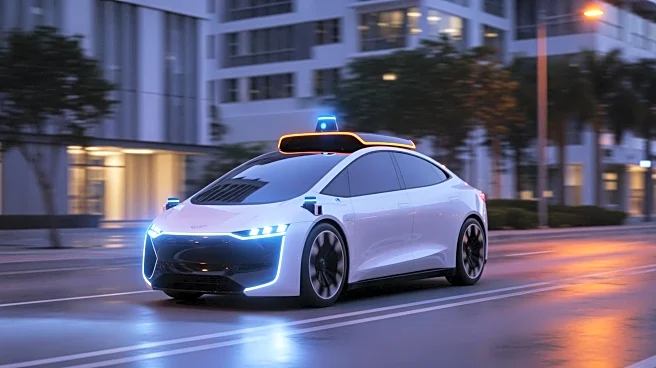What's Happening?
Waymo has announced the removal of safety operators from its fleet of robotaxis in Miami, marking a significant step towards its commercial launch in 2026. The company will begin offering fully autonomous
trips to its employees in Miami, with plans to extend this service to other cities such as Dallas, Houston, San Antonio, and Orlando in the coming weeks. This development follows Waymo's recent milestone of offering paid rides on highways in Los Angeles, San Francisco, and Phoenix. Waymo is expanding its operations nationwide, having launched services in cities like Atlanta and Austin, and partnering with companies like Uber. The company is confident in its technology and operational strategy, aiming to offer 1 million trips per week by the end of 2026.
Why It's Important?
The removal of safety drivers from Waymo's robotaxis signifies a major advancement in autonomous vehicle technology and its integration into urban transportation systems. This move could accelerate the adoption of autonomous vehicles, potentially transforming public transportation and reducing reliance on human drivers. Waymo's expansion into multiple cities indicates a growing acceptance and demand for autonomous services, which could lead to increased competition among companies like Tesla and Zoox. The success of Waymo's operations could influence regulatory policies and public perception of autonomous vehicles, impacting the future of transportation infrastructure and urban planning.
What's Next?
Waymo plans to expand its autonomous services to additional cities, including Detroit, Las Vegas, San Diego, Nashville, and London by 2026. The company is also testing its technology in New York City, with a permit to continue until the end of the year. As Waymo scales its operations, it may face challenges related to regulatory scrutiny, public safety concerns, and competition from other companies. The National Highway Traffic Safety Administration is currently investigating Waymo's technology following an incident in Atlanta, which could affect future deployments and regulatory requirements.
Beyond the Headlines
The expansion of autonomous vehicle services raises ethical and legal questions regarding safety, liability, and employment. The reduction of human drivers could lead to job displacement in the transportation sector, necessitating discussions on workforce retraining and economic impact. Additionally, the widespread use of autonomous vehicles may prompt changes in urban design, traffic management, and environmental policies, as cities adapt to new transportation technologies. The long-term implications of autonomous vehicles could reshape societal norms around mobility and accessibility.











